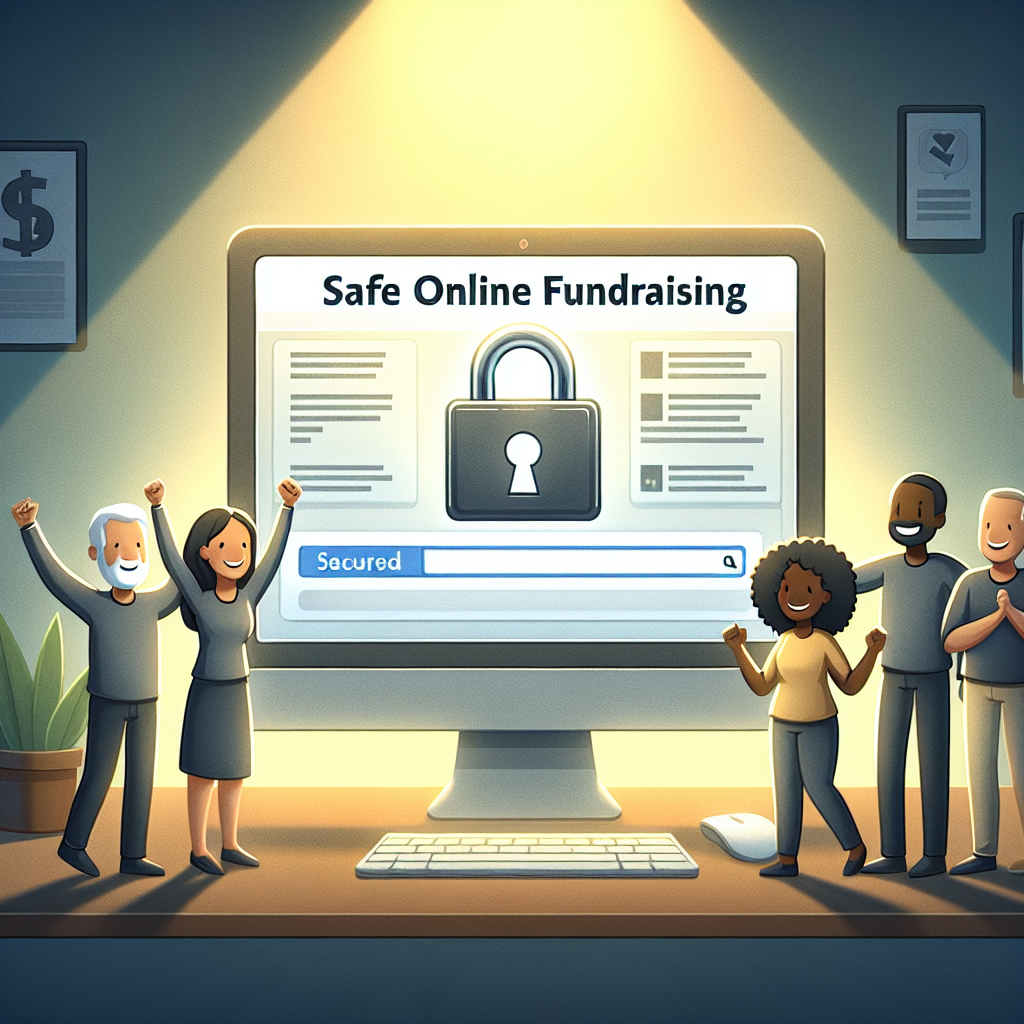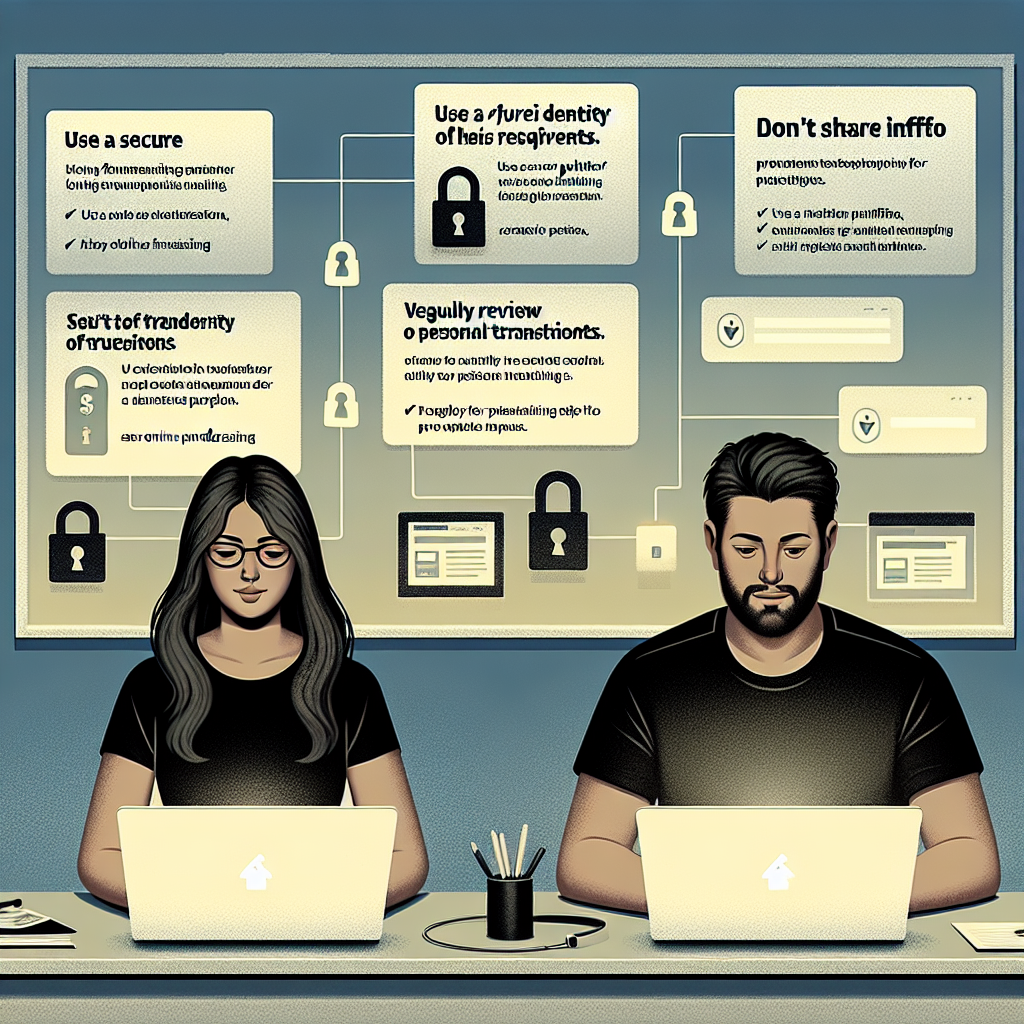In today’s digital age, online fundraising has become a popular and effective way to raise money for various causes and projects. However, with the rise of cybercrime and online scams, it is crucial to ensure that your online fundraising efforts are safe and secure. In this guide, we will provide you with essential tips and strategies to protect yourself and your donors while engaging in online fundraising. From using secure payment platforms to safeguarding personal information, these tips will help you navigate the world of online fundraising with confidence and peace of mind.
Understanding the Risks of Online Fundraising

– Identifying potential risks
– Online identity theft: Hackers may attempt to steal personal information such as credit card details or login credentials.
– Phishing scams: Fraudulent emails or websites may trick individuals into providing sensitive information.
– Fake fundraising campaigns: Scammers create fake donation pages to deceive donors into giving money to non-existent causes.
– Lack of transparency: Some online platforms may not provide clear information on how donations are used or distributed.
- Common online fundraising scams
- Disaster relief scams: Fraudsters capitalize on natural disasters or emergencies to solicit donations for fake relief efforts.
- Fake charity appeals: Scammers impersonate legitimate organizations or create fake charities to exploit donors’ generosity.
-
Overcharging or hidden fees: Some platforms may deduct high processing fees or inflate donation amounts without transparency.
-
Importance of staying vigilant
- Regularly monitor bank statements and online accounts for any suspicious activity.
- Verify the legitimacy of fundraising campaigns by researching the organization or individual behind the appeal.
- Use secure payment methods and avoid sharing sensitive information on unsecured websites.
- Report any potential scams or fraudulent activities to the relevant authorities or platforms.

Establishing Trustworthy Platforms for Online Fundraising
Researching the platform’s reputation
When engaging in online fundraising, it is crucial to thoroughly research the reputation of the platform being used. Here are some key steps to consider:
-
Checking reviews and ratings: Before committing to any online fundraising platform, take the time to read reviews and ratings from other users. Look for feedback on the platform’s reliability, transparency, and overall user experience. Pay attention to any red flags or complaints raised by previous fundraisers.
-
Verifying security measures in place: Security is paramount when it comes to online fundraising. Verify that the platform has robust security measures in place to protect sensitive donor information and transactions. Look for indications of encryption, secure payment gateways, and compliance with data protection regulations. Ensure that the platform prioritizes the safety and privacy of all involved parties.
Ensuring Data Protection
blishing Trustworthy Platforms for Online Fundraising
In the realm of online fundraising, safeguarding personal data is paramount to maintaining trust with donors and protecting sensitive information from potential cyber threats. Here are some key strategies for ensuring data protection:
-
Understanding how personal information is handled: Prior to engaging in any online fundraising activities, it is crucial to thoroughly review the platform’s privacy policy and terms of service. By understanding how the platform collects, stores, and uses personal information, fundraisers can make informed decisions about the security of their data.
-
Looking for secure payment options: When selecting an online fundraising platform, prioritize those that offer secure payment options, such as encrypted payment gateways and compliance with industry standards like PCI DSS. This extra layer of security helps prevent unauthorized access to financial information and reduces the risk of fraudulent transactions. By choosing platforms with robust data protection measures in place, fundraisers can instill confidence in donors and demonstrate a commitment to safeguarding sensitive data.
Implementing Secure Practices for Donors
Encouraging donors to use secure payment methods
When it comes to online fundraising, ensuring that donors use secure payment methods is crucial to protect their financial information. By promoting the use of reputable payment gateways, organizations can instill confidence in donors that their transactions are safe and their data is secure. Trusted payment gateways offer encryption and other security measures to safeguard sensitive information, reducing the risk of fraud or data breaches.
Furthermore, donors should be advised to avoid sharing sensitive information publicly, such as on social media or unsecured websites. Emphasizing the importance of keeping personal and financial details confidential can help prevent unauthorized access to donor accounts or identity theft. Encouraging donors to exercise caution when making online transactions can contribute to a safer and more secure fundraising experience for all parties involved.
Educating donors on phishing awareness
Phishing scams are a common tactic used by cybercriminals to deceive individuals into providing sensitive information such as passwords, credit card numbers, or personal details. By educating donors on phishing awareness, organizations can help prevent fraudulent activities and protect the security of online fundraising efforts.
- Recognizing phishing emails and websites
- Encourage donors to carefully examine the sender’s email address for any irregularities or suspicious domains.
- Advise donors to hover over links in emails to preview the destination URL before clicking.
-
Remind donors to be cautious of urgent language, grammatical errors, and requests for confidential information in unsolicited emails.
-
Tips for verifying donation requests
- Encourage donors to independently verify the legitimacy of fundraising campaigns by visiting the organization’s official website or contacting them directly.
- Advise donors to refrain from providing personal information or making donations through unfamiliar platforms or links.
- Recommend donors to use secure payment methods and avoid sharing financial details over insecure channels.
Safeguarding Personal Information as a Fundraiser
Creating strong passwords and changing them regularly
Creating strong passwords is crucial for safeguarding personal information when engaging in online fundraising activities. Strong passwords should consist of a combination of letters (both uppercase and lowercase), numbers, and special characters to enhance security. It is advisable to avoid using easily guessable information such as birthdays, names, or common phrases.
Regularly changing passwords is another essential practice to maintain the security of online fundraising accounts. Frequent password changes can help prevent unauthorized access and reduce the risk of potential security breaches. It is recommended to update passwords every few months or immediately following any security incidents or concerns.
In addition to strong passwords and regular changes, utilizing password managers can streamline the process of managing multiple complex passwords for different fundraising platforms. Password managers offer a secure way to store and access passwords, reducing the likelihood of forgetting or compromising them.
Implementing two-factor authentication provides an extra layer of security for online fundraising accounts. This feature typically requires users to enter a verification code sent to their registered email or mobile device in addition to their password, adding an additional barrier against unauthorized access.
Being cautious with sharing fundraiser details
When it comes to online fundraising, safeguarding personal information is crucial to ensure the safety and security of both the fundraiser and the donors. Here are some specific ways to be cautious with sharing fundraiser details:
-
Minimizing personal information on public platforms: Avoid disclosing sensitive personal details such as home address, phone number, or financial information on public fundraising pages or social media platforms. Keep the focus on the cause and the fundraising goal rather than personal information that could be exploited by malicious parties.
-
Avoiding oversharing on social media: While it’s important to promote your fundraiser on social media to reach a wider audience, be mindful of the information you share. Limit the specifics of your personal life and stick to sharing relevant updates about the fundraising progress, success stories, and impact achieved. Avoid sharing details that could potentially compromise your privacy or security.
By being cautious with sharing fundraiser details and prioritizing the protection of personal information, fundraisers can create a safe and secure environment for themselves and their donors to support a cause effectively.
Monitoring and Reporting Suspicious Activities
Regularly reviewing fundraising campaign analytics
Regularly reviewing fundraising campaign analytics is crucial for ensuring the safety and success of online fundraising efforts. By monitoring these analytics, organizations can gain valuable insights into the performance of their campaigns and detect any irregularities that may indicate fraudulent activity. Some key points to consider when reviewing fundraising campaign analytics include:
-
Identifying unusual donation patterns: Analyzing donation patterns can help organizations identify any unusual or suspicious activity, such as a sudden influx of donations from unfamiliar sources or a high number of donations in a short period of time. These anomalies could be indicative of fraudulent behavior and should be investigated further.
-
Reporting any suspicious behavior to the platform: If any suspicious activity is detected during the review of fundraising campaign analytics, it is important to report it promptly to the online fundraising platform. Platforms often have measures in place to investigate and address potential fraudulent activity, and reporting such behavior can help protect both the organization and its donors from harm.
Regularly reviewing fundraising campaign analytics is a proactive step that organizations can take to safeguard their online fundraising efforts and maintain the trust of their donors. By staying vigilant and responsive to any signs of suspicious activity, organizations can help ensure a safe and successful fundraising experience for all involved.
Understanding the process of reporting fraud
Process of Reporting Fraud
Reporting fraud is crucial to safeguarding your online fundraising efforts. To effectively report fraudulent activities, it is important to follow a systematic process:
-
Document the Evidence: Keep a record of any suspicious emails, transactions, or communications related to the potential fraud. This documentation will be essential when reporting the incident.
-
Contact the Platform: If the fraudulent activity is taking place on a specific fundraising platform, reach out to the platform’s support team immediately. They may have specific protocols in place for reporting fraud and can guide you through the process.
-
File a Complaint with Authorities: In cases of serious fraud or cybercrime, it is advisable to file a formal complaint with law enforcement agencies such as the local police department or the Internet Crime Complaint Center (IC3).
-
Notify Your Financial Institution: If the fraud involves unauthorized transactions or compromised financial information, contact your bank or credit card company to report the incident. They can help you secure your accounts and prevent further losses.
-
Collaborate with Authorities: Be prepared to cooperate with any investigations initiated by law enforcement or regulatory bodies. Provide them with all relevant information and evidence to aid in their efforts to combat online fraud.

By understanding the process of reporting fraud and taking swift action, you can protect your online fundraising activities and prevent potential financial losses.
Building Trust with Transparency and Communication
Providing clear information about the fundraising cause
Clear and detailed information about the fundraising cause is essential to establish trust with potential donors and ensure transparency throughout the fundraising process. Here are some key points to consider:
-
Clearly define the purpose: Clearly outline the specific cause or project for which funds are being raised. Provide detailed information about why the fundraising initiative is important, who will benefit from the funds, and how the donations will make a difference.
-
Breakdown of expenses: Provide a breakdown of how the funds will be used, including any associated costs or fees. Be transparent about how much of the donations will go directly towards the cause versus administrative expenses.
-
Goals and objectives: Clearly state the goals and objectives of the fundraising campaign. Outline what you hope to achieve with the funds raised and how these goals will be measured and tracked.
-
Impact and outcomes: Communicate the anticipated impact of the fundraising efforts and the expected outcomes. Provide examples of how donations will be put to use and the positive changes that will result from the support received.
-
Legal and regulatory compliance: Ensure that all fundraising activities and communications comply with relevant laws and regulations. Provide information about any permits or licenses obtained for the fundraising campaign and how donor privacy and data protection will be maintained.
Being responsive to donor inquiries and concerns
When conducting online fundraising, being responsive to donor inquiries and concerns is crucial to building trust and credibility. Donors may have questions about the cause, how their donations will be utilized, or the organization’s credibility. Therefore, it is essential to prioritize responsiveness and transparency in all communications.
-
Establishing open communication channels: Provide multiple ways for donors to reach out, such as email, phone, or live chat support on the fundraising platform. Clearly display contact information on the fundraising page and respond promptly to any inquiries received.
-
Addressing feedback and questions promptly: Donors appreciate timely responses to their questions and feedback. Whether it’s clarifying how donations are allocated or providing updates on the impact of their contributions, addressing inquiries promptly demonstrates accountability and fosters donor trust. It is important to have a designated team or individual responsible for managing donor communications and ensuring that all inquiries are addressed in a timely manner.
FAQs Tips for Safe Online Fundraising
What are some tips for creating a secure online fundraising campaign?
When creating a secure online fundraising campaign, it is essential to use a reputable platform that encrypts all payment information. Make sure to set up strong passwords and enable two-factor authentication to protect your account from unauthorized access. Additionally, clearly communicate with donors about how their information will be used and ensure that all transactions are securely processed.
How can I protect donors’ personal information when fundraising online?
To protect donors’ personal information when fundraising online, only collect necessary data and securely store it in compliance with data protection regulations. Use a secure payment gateway that encrypts all transactions and never share donors’ information with third parties without their consent. Be transparent about your privacy policy and inform donors how their information will be used.
What should I do in case of a fraudulent donation or cyber attack during my online fundraising campaign?
If you encounter a fraudulent donation or cyber attack during your online fundraising campaign, immediately report the incident to the platform provider and your financial institution. Take necessary steps to secure your account and inform donors about the situation. Depending on the severity of the attack, you may need to involve law enforcement or cybersecurity professionals to investigate and mitigate future risks.
How can I build trust with donors when fundraising online?
Building trust with donors when fundraising online is crucial for the success of your campaigns. Be transparent about your fundraising goals and how donations will be used. Provide regular updates on the progress of your campaign and share success stories to show the impact of donors’ contributions. Respond promptly to donor inquiries and address any concerns or feedback with professionalism and accountability. By building trust with donors, you can cultivate long-lasting relationships that support your fundraising efforts.


